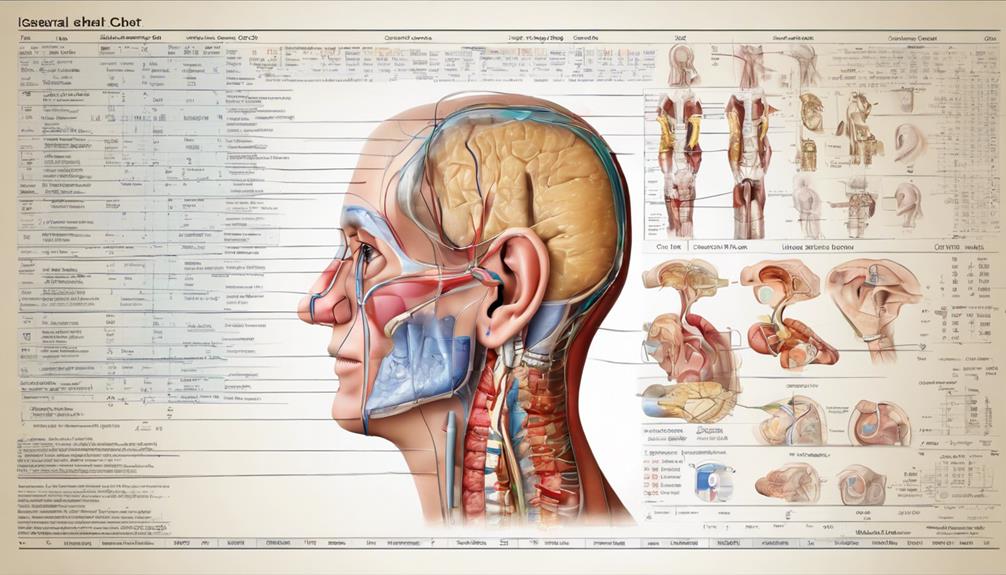Meniere’s disease is a complex condition that presents a combination of symptoms including tinnitus, vertigo, and gradual hearing loss.
As we navigate through the intricacies of this disorder, one can't help but wonder about the underlying mechanisms that tie these symptoms together.
Let's explore the enigma surrounding this disorder and uncover the intricate web that connects these seemingly disparate manifestations.
Key Takeaways
- Ménière's disease is characterized by tinnitus, vertigo, and gradual hearing loss.
- Inner ear fluid imbalances are the main cause of these distressing symptoms.
- Diagnosis involves specialized testing and a thorough medical history review.
- Treatment options include medications, surgery, vestibular therapy, and hearing aids.
Top picks for "disorder call tinnitu"
Open Amazon search results for this keyword.
As an affiliate, we earn on qualifying purchases.
Understanding Ménière's Disease
Ménière's disease, an inner ear disorder, presents with distressing symptoms like tinnitus, vertigo, and gradual hearing loss. The gradual hearing loss typifies Ménière's disease and is often accompanied by a feeling of fullness in the affected ear. This condition is thought to be caused by an abnormal buildup of fluid in the inner ear, known as endolymphatic hydrops. The excess fluid disrupts the normal hearing and balance functions of the inner ear, leading to the characteristic symptoms of the disease.
As Ménière's disease progresses, individuals may experience fluctuations in their hearing abilities, with some noticing a decline in low-frequency sounds initially. Over time, the hearing loss may become more pronounced and affect speech comprehension and overall communication. Understanding the impact of gradual hearing loss in Ménière's disease is crucial for both patients and healthcare providers in developing effective management strategies and interventions to improve quality of life. By addressing the underlying fluid imbalance in the inner ear, treatment approaches can aim to alleviate symptoms and preserve hearing function.
Causes of the Triad Symptoms

Fluid imbalances within the inner ear are believed to underlie the triad symptoms of tinnitus, vertigo, and gradual hearing loss seen in Ménière's syndrome. These fluid imbalances can disrupt the delicate environment of the inner ear, leading to dysfunction in the sensory cells responsible for hearing and balance. The exact mechanisms by which these fluid fluctuations occur aren't fully understood, but their impact on the sensory cells is a key factor in the development of Ménière's syndrome. The interplay between fluid imbalances and sensory cell damage manifests as the characteristic symptoms of the disorder.
Causes of Ménière's Syndrome Symptoms:
- Inner Ear Fluid Imbalances: Disruption in the fluid levels of the inner ear can affect the function of sensory cells.
- Sensory Cell Damage: Damage to these cells due to fluid imbalances can result in hearing loss, tinnitus, and vertigo.
- Impact on Symptoms: The interaction between fluid imbalances and sensory cell damage contributes to the triad of symptoms in Ménière's syndrome.
Understanding these underlying causes is essential for accurate diagnosis and effective treatment strategies.
Diagnosis and Testing Methods
When diagnosing Ménière's disease, healthcare providers rely on a combination of medical history review, symptom assessment, physical examination, and specialized testing procedures. Given that Ménière's disease is linked to the inner ear and fluid buildup, essential tests often include audiologist-conducted hearing tests to assess any gradual hearing loss.
In addition to hearing tests, further specialized testing methods may be necessary depending on the specific symptoms experienced by the individual, such as episodes of vertigo. It isn't uncommon for a general practitioner to refer patients to a specialist for a more thorough evaluation and accurate diagnosis of Ménière's disease. This specialist referral is crucial in ensuring that the individual receives the appropriate care and treatment plan tailored to their unique condition.
A comprehensive diagnosis aids in determining the most suitable treatment strategies to manage the symptoms associated with Ménière's disease effectively.
Treatment Options Available

Effective management of symptoms in individuals diagnosed with Ménière's disease involves a range of treatment options tailored to the severity of the condition. Here are some key approaches to managing Ménière's disease:
- Medications for Symptom Management: Medications such as diuretics, anti-nausea drugs, and vestibular suppressants are commonly prescribed to alleviate vertigo, nausea, and other symptoms associated with Ménière's disease.
- Surgical Interventions: In severe cases where symptoms aren't well-controlled with medications, surgical procedures like endolymphatic sac decompression or vestibular nerve section may be recommended to reduce fluid pressure in the inner ear.
- Vestibular Rehabilitation Therapy: This specialized form of therapy can help improve balance, reduce dizziness, and enhance overall quality of life for individuals with Ménière's disease by promoting central nervous system compensation for inner ear deficits.
These treatment options, along with hearing aids and regular medical monitoring, play a crucial role in managing the symptoms and progression of this complex inner ear disorder.
Research and Future Prospects
Our research endeavors in the field of Ménière's disease are dedicated to unraveling the underlying causes of this condition and pioneering innovative treatment modalities to enhance patient outcomes. Ménière's disease is a disorder of the inner ear characterized by a buildup of fluid in the compartments of the inner ear, affecting the sensory cells that send signals to the brain for hearing and balance. Through a comprehensive review of patients' medical histories and advanced imaging techniques, we aim to identify patterns and potential triggers that contribute to the onset and progression of Ménière's disease.
As we delve deeper into the complexities of this condition, our focus is on exploring novel therapeutic approaches that target the root causes of Ménière's disease. By understanding the mechanisms that lead to symptoms such as tinnitus, vertigo, and gradual hearing loss, we strive to develop tailored interventions that can provide relief and improve the quality of life for individuals affected by this debilitating disorder. Collaboration with healthcare providers and active participation in clinical trials are essential components of our research efforts to pave the way for enhanced management strategies and improved outcomes for patients living with Ménière's disease.
Frequently Asked Questions
What Disorder Is Associated With Tinnitus Vertigo and Hearing Loss?
When tinnitus, vertigo, and hearing loss are present, a disorder that may be the cause is Ménière's disease. This condition affects the inner ear and can lead to severe dizziness and balance issues.
Ménière's disease is characterized by recurring tinnitus, episodes of vertigo, and progressive hearing loss. It's diagnosed based on symptoms like vertigo, tinnitus, and hearing problems.
Seeking medical advice is crucial when experiencing these symptoms.
What Neurological Conditions Cause Tinnitus?
Neurological conditions like vestibular schwannoma and multiple sclerosis can cause tinnitus.
Vestibular migraine, a neurological disorder, is also associated with tinnitus.
Central auditory processing disorders, linked to neurological conditions, can lead to tinnitus.
These conditions highlight the complexity of neurological influences on hearing health.
If you're experiencing tinnitus, it's essential to consult with a healthcare professional for proper evaluation and management tailored to your specific needs.
Is Tinnitus Precursor to Dementia?
We must address the concerning link between tinnitus and dementia. Research suggests a potential connection, indicating individuals with severe tinnitus may face increased cognitive decline risk.
Understanding this relationship can guide early intervention strategies. Managing tinnitus effectively may help reduce associated cognitive issues.
Let's prioritize regular monitoring and proactive treatment for overall brain health and cognitive function, potentially mitigating risks of future cognitive decline.
Is There a Link Between Tinnitus and Vertigo?
Yes, there's a strong link between tinnitus and vertigo. These symptoms often coexist in conditions like Ménière's disease, where fluid buildup in the inner ear affects balance and hearing.
Understanding this connection is vital for effective diagnosis and management. The presence of both tinnitus and vertigo can lead to debilitating episodes of dizziness and balance issues, impacting daily life significantly.
It's crucial to address these symptoms promptly for improved quality of life.
Conclusion
In conclusion, Ménière's disease is a complex inner ear disorder that can significantly impact individuals' quality of life.
Did you know that approximately 615,000 individuals in the United States are affected by Ménière's disease?
With symptoms like tinnitus, vertigo, and gradual hearing loss, early diagnosis and effective management are crucial in helping individuals cope with this condition.
Continued research and advancements in treatment options offer hope for those living with Ménière's disease.









